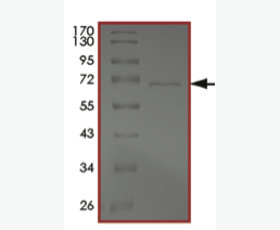Recombinant Human Interleukin-8/IL-8
| Product name: | Recombinant Human Interleukin-8/IL-8 |
| Source: | Human Cells |
| Purity: | Greater than 95% as determined by reducing SDS-PAGE. |
| Buffer Formulation: | Lyophilized from a 0.2 μm filtered solution of 20mM PB,150mM NaCl,pH7.4. |
| Applications: | Applications:SDS-PAGE; WB; ELISA; IP. |
| Storage: | Avoid repeated freeze/thaw cycles. Store at 2-8 oC for one month. Aliquot and store at -80 oC for 12 months. |
| UOM: | 100ug/50ug/200ug/1mg/1g |
| Source | Human Cells |
| Description | Recombinant Human C-X-C motif chemokine 8 is produced by our Mammalian expression system and the target gene encoding Glu21-Ser99 is expressed with a 6His tag at the C-terminus. |
| Names | Interleukin-8, IL-8, C-X-C Motif Chemokine 8, Emoctakin, Granulocyte Chemotactic Protein 1, GCP-1, Monocyte-Derived Neutrophil Chemotactic Factor, MDNCF, Monocyte-Derived Neutrophil-Activating Peptide, MONAP, Neutrophil-Activating Protein 1, NAP-1, Protein 3-10C, T-Cell Chemotactic Factor, IL8, CXCL8 |
| Accession # | P10145 |
| Formulation | Lyophilized from a 0.2 μm filtered solution of 20mM PB,150mM NaCl,pH7.4. |
| Shipping |
The product is shipped at ambient temperature. |
| Reconstitution |
Always centrifuge tubes before opening. Do not mix by vortex or pipetting. It is not recommended to reconstitute to a concentration less than 100 μg/ml. Dissolve the lyophilized protein in ddH2O. Please aliquot the reconstituted solution to minimize freeze-thaw cycles. |
| Storage |
Lyophilized protein should be stored at < -20°C, though stable at room temperature for 3 weeks. Reconstituted protein solution can be stored at 4-7°C for 2-7 days. Aliquots of reconstituted samples are stable at < -20°C for 3 months. |
| Purity |
Greater than 95% as determined by reducing SDS-PAGE. |
| Endotoxin | Less than 0.1 ng/µg (1 IEU/µg) as determined by LAL test. |
| Amino Acid Sequence |
EGAVLPRSAKELRCQCIKTYSKPFHPKFIKELRVIESGPHCANTEIIVKLSDGRELCLDPKENWV QRVVEKFLKRAENSVDHHHHHH
|
| Background | Interleukin-8 (IL-8) belongs to the neutrophil-specific CXC family of chemokines. It is one of the initial cytokines released from a variety of cell types, including T cells, endothelial cells and fibroblasts, in response to an inflammatory stimulus and acts by recruiting neutrophils, T-cells and basophils to the site of inflammation. Elevated Interleukin-8 levels are associated with the onset of a variety of disease states. |
| References |
Inactivation of α1-proteinase inhibitor by Candida albicans aspartic proteases favors the epithelial and dothelial cell colonization in the presence of neutrophil extracellular trapsof doxorubicin |














